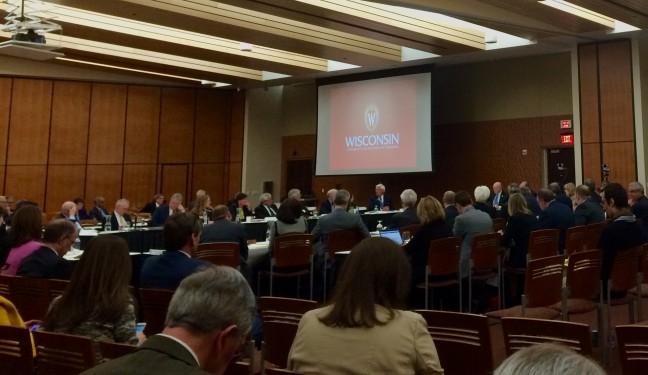Several University of Wisconsin System regents expressed disappointment about the proposed public authority, calling it “fairy dust” in the face of budget cuts, during a UW Board of Regents meeting Thursday.
Gov. Scott Walker’s biennial budget includes a $300 million cut to the UW System. With these cuts, Walker said he would make the UW System a public authority, which would give it more autonomy to make decisions.

Ray Cross, UW System president, made three requests to legislators during Tuesday’s Joint Finance Committee briefing: for a public authority for the UW System, a stable funding stream and to reduce the $300 million proposed cut.
Many faculty and students in the UW System have expressed concern about the public authority. Cross attempted to reassure them that the UW System’s transition into a public authority would be seamless and would stabilize operations.
Cross said with a public authority, the UW System has more freedom to choose how it allocates its funds.
“If like me you believe that more of our resources belong in our classrooms then … you should support us as an authority,” Cross said.
David Walsh, Board of Regents member, voiced his dissatisfaction with a proposed funding shift. This would turn state money into a block grant, with increased ties to the consumer price index, he said.
Walsh said the UW System could not rely on the Legislature to continue the funding process, referring to the idea as “fairy dust.”
“It’s time we step forward and send a message to the people of Wisconsin that this is wrong, it’s bad for Wisconsin and it’s not who we are,” Walsh said.
Michael Falbo, Board of Regents president said he believes now is the time for UW to pursue a public authority.
“It is a challenging time, but I also see it as a time of opportunity,” Falbo said.
Many chancellors spoke about how the proposed budget cut to the UW System will affect their specific campus. Richard Telfer, UW-Whitewater chancellor, was concerned about larger class sizes and a decreasing amount of classes offered for his campus.
Jose Delgado, Board of Regents member, said the cuts may affect more than changes in class availability and size. Delgado said the proposed budget cut could shrink the system as a whole.
“We can have our opinions whether this is bad for the state but what we cannot have is illusions … that if we are seeing a sea change in funding, we should see a sea change in work,” Delgado said. “This university system may have to shrink if this is the level of funding we have.”
Margaret Farrow, former Republican Lt. Governor and Board of Regents member, raised concern that legislators and the media are failing to grasp how complex the budget’s impact will be on the UW System. The board needs to come up with a concise way to verbalize the immense impact as soon as possible, she said.

“The fiscal bureau is going to give (legislators) the answer they’re asking for, not the answer we want them to see, necessarily,” Farrow said. “We have to provide our own facts instead of the way they want the facts formulated for them by the fiscal bureau. So we almost have to have them ready to give them the rest of the story.”
The Regents also voted in favor of establishing two task forces, one focused on tenure and the other on shared governance. Chancellors, students, faculty, staff and provosts will be appointed to the task force by Sept. 1. This appointment date would give task force members time to change statutes before public authority would be implemented July 1, 2016.


